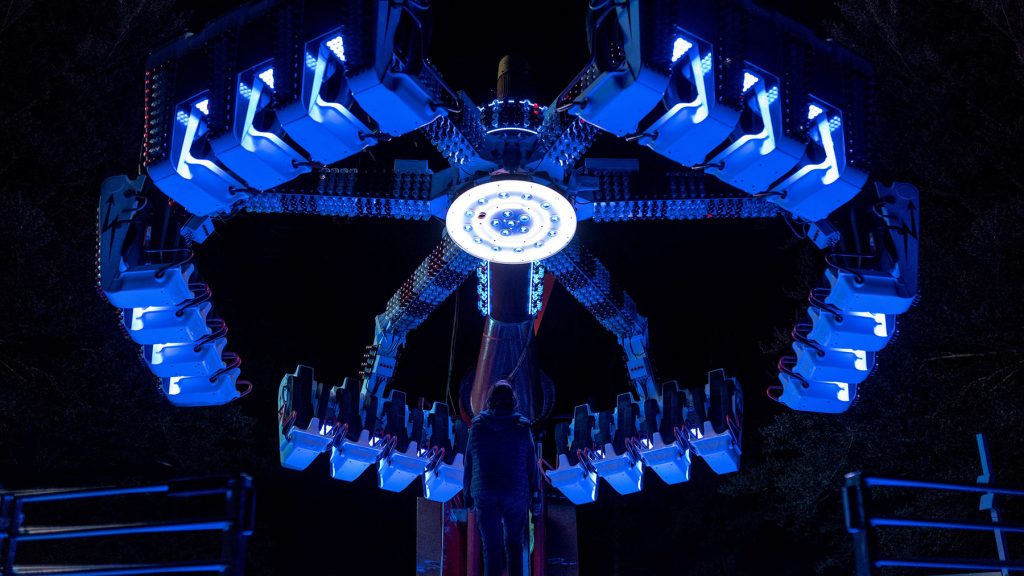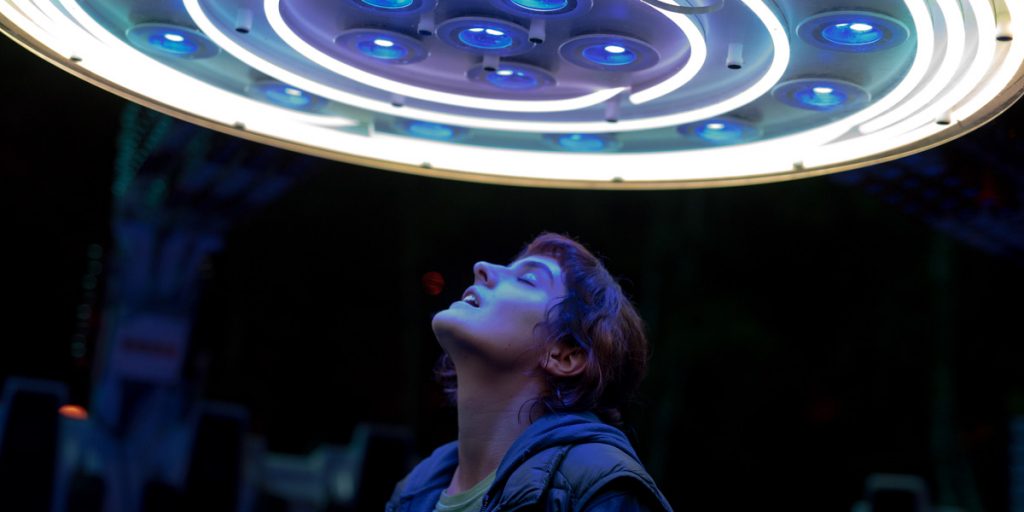Jumbo delves deeper into unconventional love and portrays one woman’s newly found happiness that shows inanimate love partners can be intimate as well.
When it comes to love, there’s no doubt about it that it is all around us. There’s also no question that there are various kinds of love – the love I feel for my friends and family is not actually the same love I have for pizza. However, when it comes to romantic love, we are still very much stuck in same old conventions as we were a hundred years ago. Whether it’s boy plus girl, girl plus girl, or boy plus boy, the simple truth of the matter is that the only romantic love-relationship you can have, has to be with a someone. Director Zoé Wittock wanted to question what one defines as normal versus monstrous in her seductive and poetic adventure of a film, Jumbo.
Wittock was inspired by the story of Erika LaBrie, an Olympic gold winner in archery who fell in love with the Eiffel Tower. After three years of courtship, she married the Eiffel Tower in 2004 and legally became Erika Eiffel. Erika was one of the first people with the so-called objectum sexuality to come forward. Finding herself as one of many, she founded OS Internationale, a worldwide support group for people who find love in what heteronormative society finds bizarre and controversial. It is the breaking of this conventional boundary that compelled Wittock to create an atypical coming-of-age love story in her first feature film. How did she become like that? What draws her to objects? How does she experience her love? When did she know? With Jumbo, a curious Zoé Wittock attempts to answer all these questions while leaving plenty for you to still find out.
Set somewhere in Belgium, Jumbo details the blossoming intimacy between a shy young woman and a new ride at an attraction park. Jeanne (Noémie Merlant, Portrait of a Lady on Fire, Les Drapeaux de Papier) lives at home with her liberal down-to-earth mother Margarette (Emmanuelle Bercot, My King, The Enemy). At night, Jeanne is a cleaner at an amusement park, and during the day she daydreams in her room while meticulously recreating the amusement park rides in miniature from wire, complete with light bulbs and spare parts. The more time she spends with the new alluring Move It-ride, the more communicative and attractive it becomes. She decides to call him Jumbo and soon spends all her late-night shifts falling readily and deeply head over heels. Seduced by his flashing red and green lights, smooth chrome, and oily hydraulics, Jeanne realises that the one and only relationship she will ever want to pursue is with Jumbo. She only has to convince her mother.

Jumbo certainly is a quirky coming-of-age story like no other. It is a modern take on love and its infinite possibilities. The film’s high-quality visuals, by cinematographer Thomas Buelens (Tous Les Chats Sont Gris, Christmas in Paris), bring Jumbo a life in a way that matches the intensity of Jeanne’s love. The imaginative and beautiful way in which emotions are expressed from scene to scene balances the humoristic undertones in dramatic moments. With Jumbo, Wittock makes a statement about tolerance and the freedom of one’s own choices. Think of a crossover between Guillermo del Toro’s The Shape of Water (2017), a romantic fantasy drama of a mute cleaner who falls in love with a captured humanoid amphibian creature, and the Duffer Brothers’ Stranger Things, a science fiction horror mystery-thriller where a group of young boys come into contact with an alternate world created by a nearby research facility.
Though the majority of Jumbo’s magic comes from the visuals and the sound, the film lacks in compelling and empathic qualities throughout the narrative. The film often refers to Jeanne’s mental health, but it never actually delves deeper into that. Wherever the film attempts at seriousness, it also immediately shies away from actually discussing it. This results in an almost fairy-tale like approach to the story of Jeanne and Jumbo as a couple that turns the film from a clever approach to objectum sexuality to a fantasy romantic science fiction. The ambiguity of Jeanne’s mental health, together with her character and demeanour, might invoke notes of empathy but at the same time distances the viewer with the realness of her situation. It is almost as if Jeanne was made to be the type of person who falls in love with inanimate objects, inadvertently stereotyping people who are objectum sexual.
While Jumbo explores the intricate intimacies of a loving relationship with an inanimate object, complete with a steamy (and oily) love scene that shows exactly how sensual these relationships can become, it seems to rush and skips through the early stages of every infatuation. The narrative dives into the deep end of a steady relationship in a time too fast for the viewer to fully understand what Jeanne sees in Jumbo and how the attraction develops. I found it hard to get immersed into the portrait of a relationship with an object, when I can’t relate it to the stages you go through in a heteronormal relationship. Wittock does a visually stunning and immersive job of object-relationships, though the film lacks in emotional depth. Nonetheless, I wish everyone a love like Jeanne has for Jumbo.
Jumbo will have its UK Premiere at the Glasgow Film Festival on 27th February, 2021.

